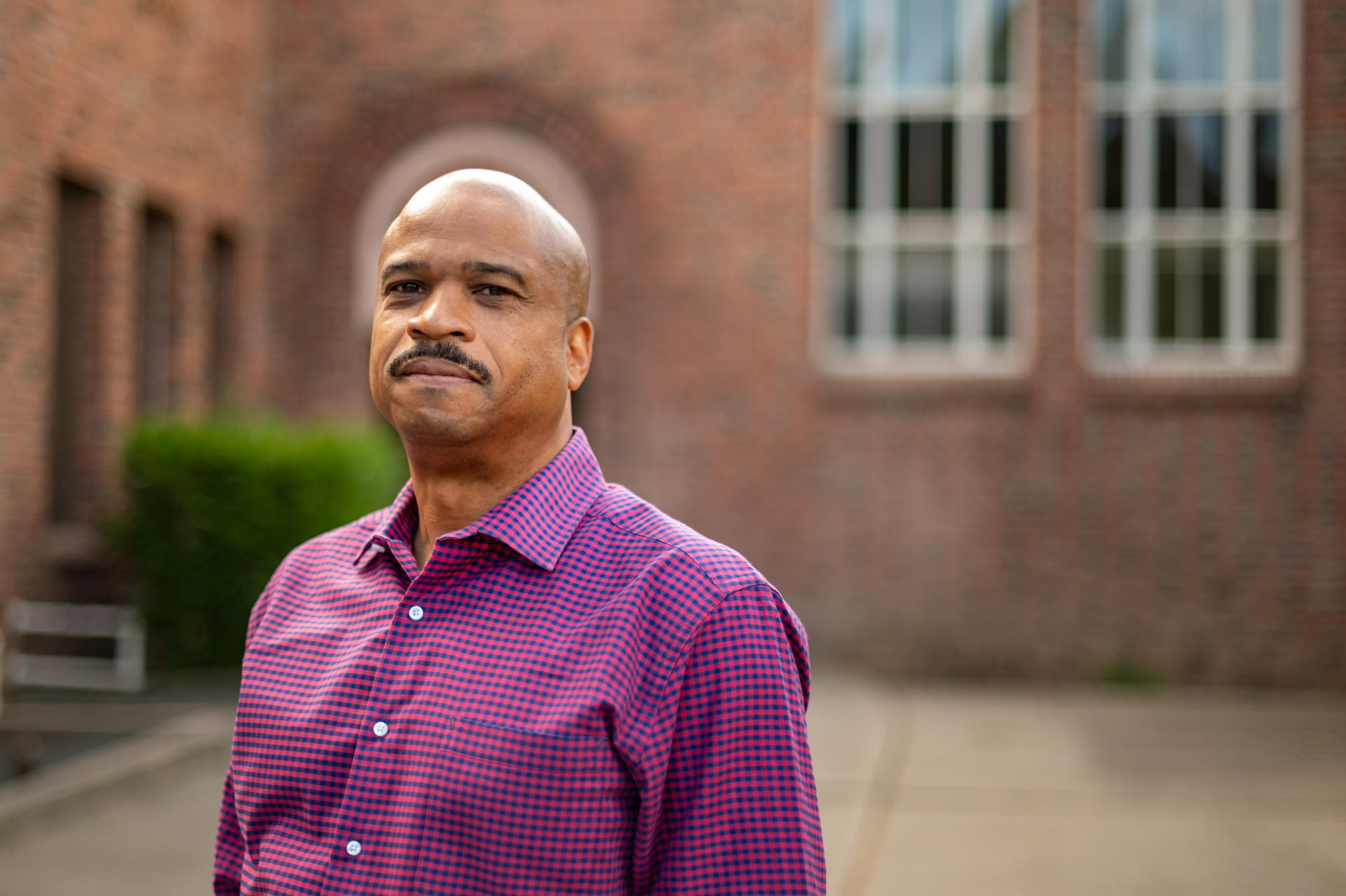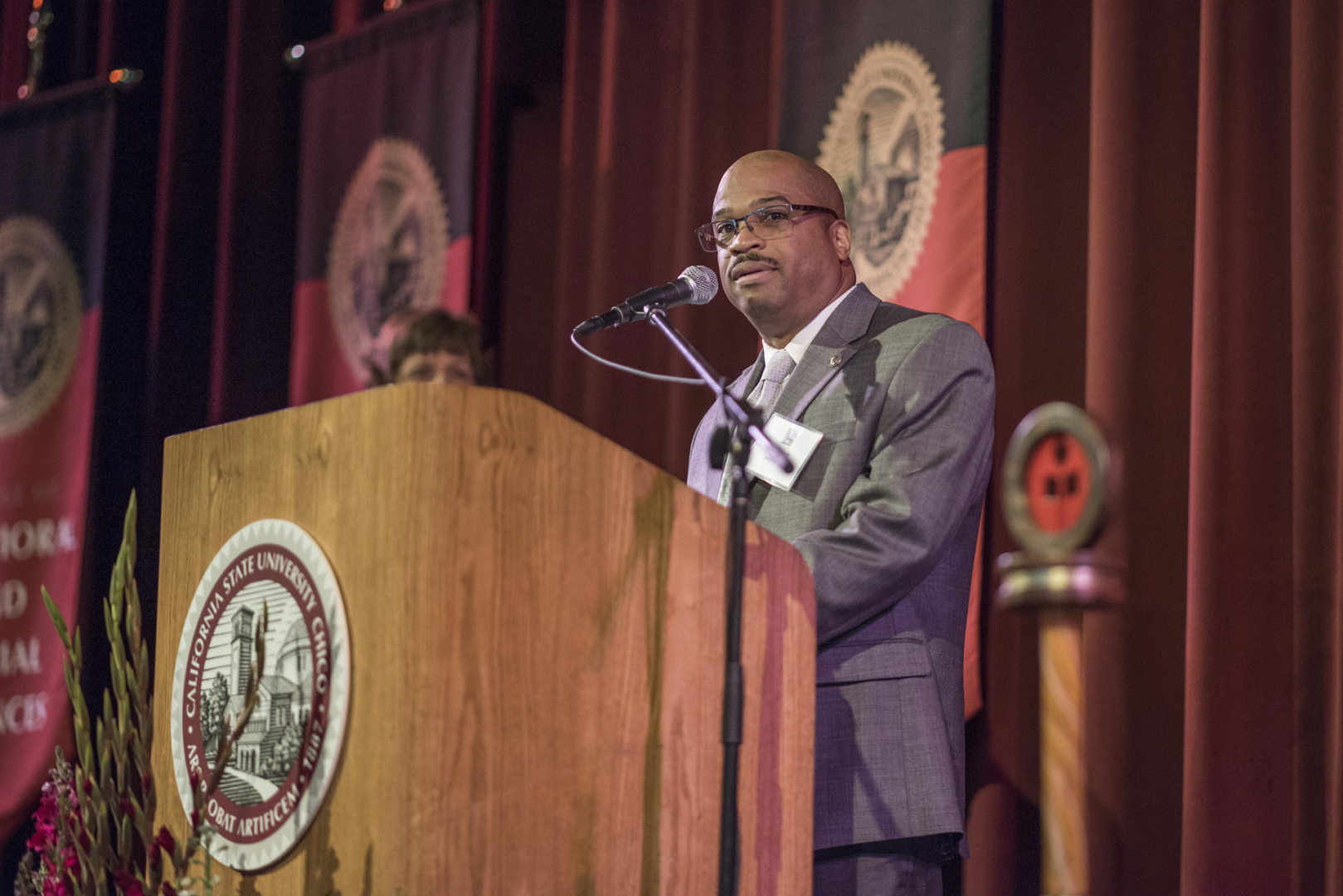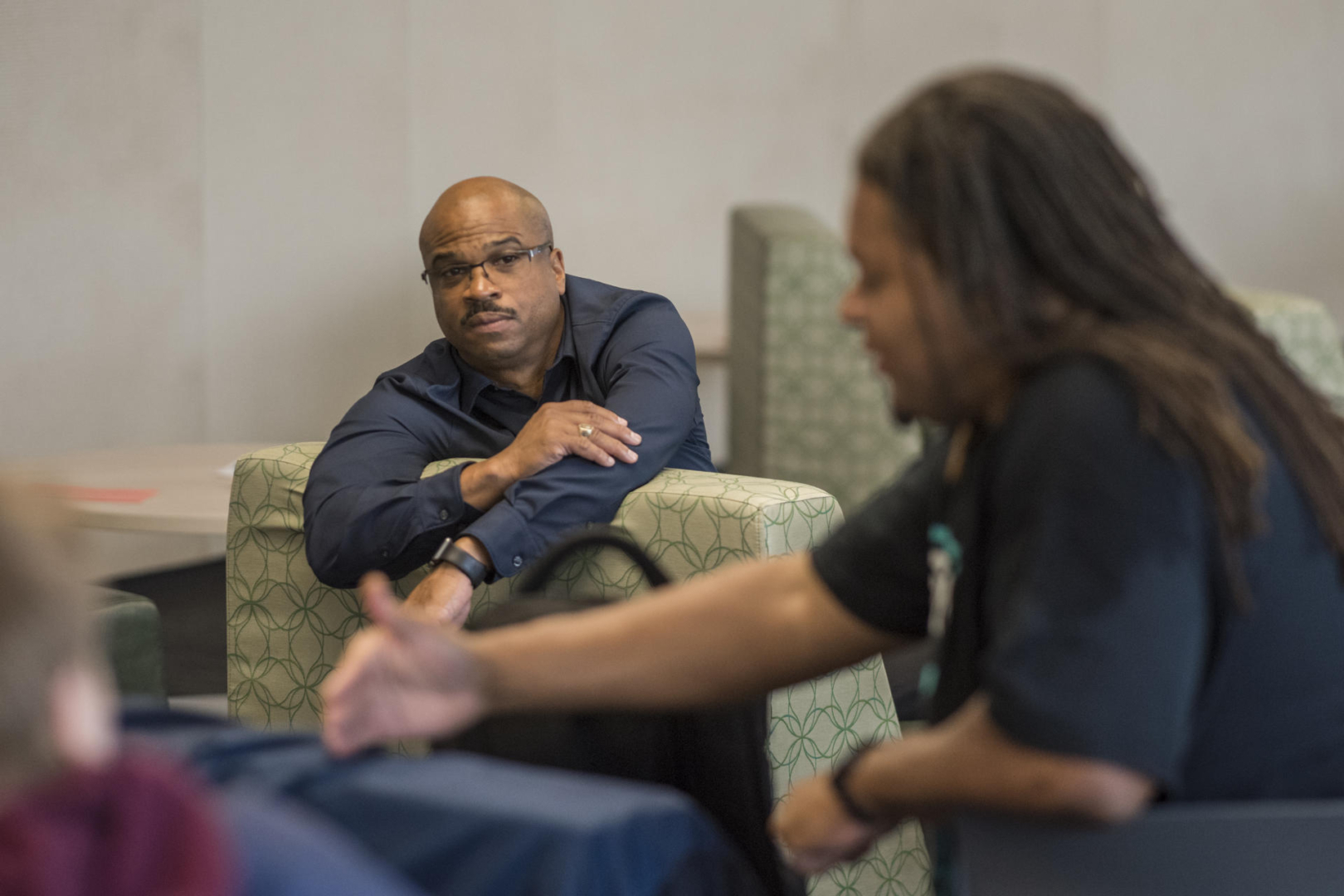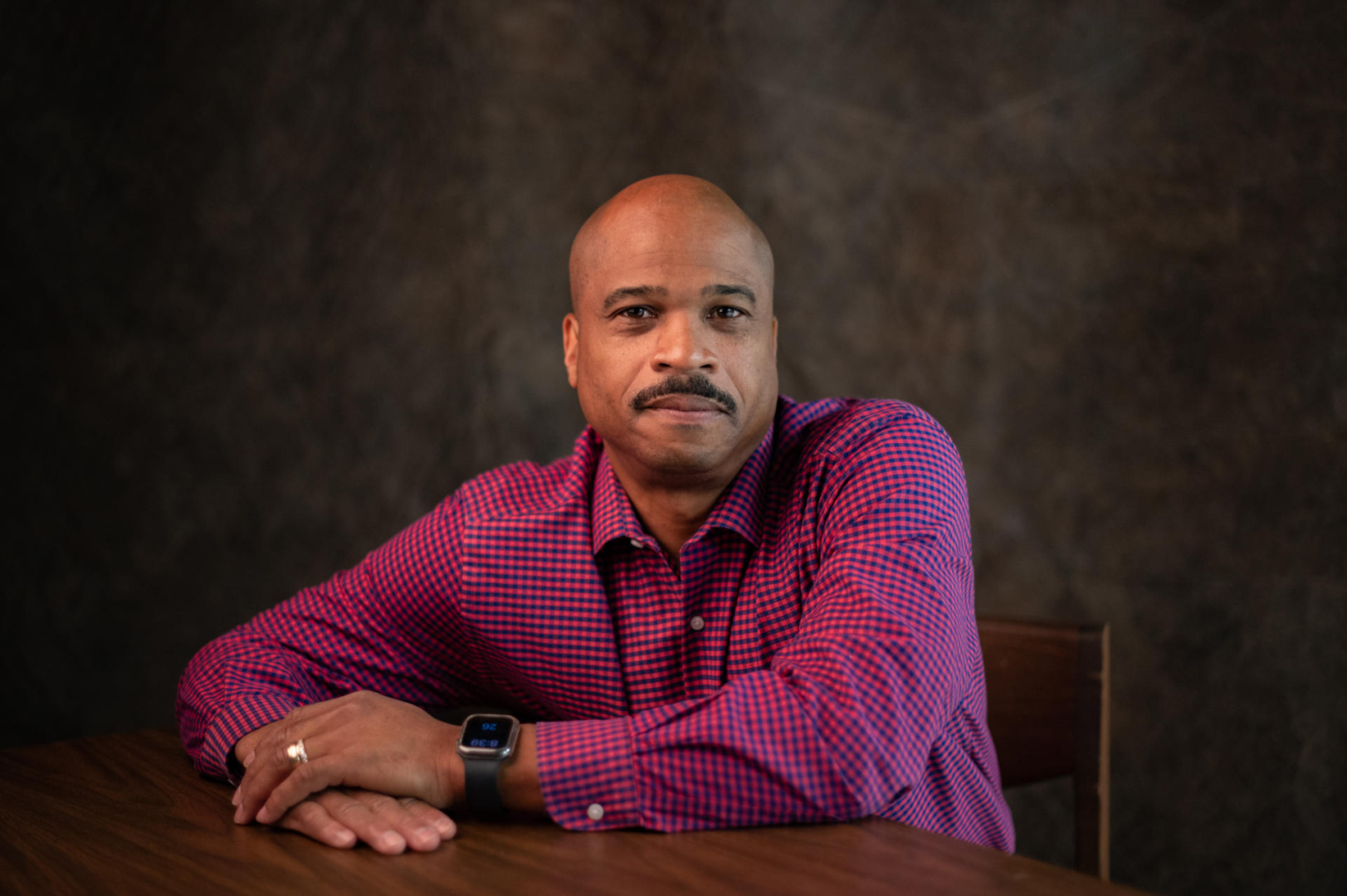Diversity Champion Leaves Legacy of Success Among Students, Colleagues

Tray Robinson has a portrait taken on Wednesday, May 26, 2021 in Chico, Calif. Chico State is planning for the departure of Robinson, interim chief diversity officer and director of the Office of Diversity and Inclusion. Robinson has a wonderful opportunity ahead of him at Butte College as the inaugural Inclusion, Diversity, Equity, and Anti-Racism Officer. (Jason Halley/University Photographer/CSU, Chico)
In every role he has held—from promising student-athlete and first-gen graduate to a valued employee and tireless equity, diversity, and inclusion (EDI) advocate—Tray Robinson has left his mark in countless ways.
In recognition of his invaluable contributions, the Conversations on Diversity and Inclusion committee honored him with the Lifetime Achievement Award last month.
“Tray’s gift for bringing people together and inspiring others to achieve things for the collective good is truly inspiring,” said longtime colleague Michelle Morris. “His incredible patience with slow—sometimes painstakingly slow—but steady progress in all things EDI has served as a valuable lesson to me and so many others.”
True to his humble and collaborative nature, Robinson (Liberal Studies, ’95; MA, Human Relations, ’10) credits much of his success and inspiration to his campus mentors. But to those who know him, his impact is without question—and goes far beyond Chico State.
His roles include director of the Office of Diversity and Inclusion, lecturer in the Multicultural and Gender Studies Department (MCGS), and, since January 2020, interim chief diversity officer. He has served and advised on no fewer than 30 councils, committees, and task forces on and off campus, including the Black Faculty and Staff Association, First-Year Experience program, Foster Youth Committee, and Stonewall Alliance Center of Chico.
Later this month, he will forge a new professional chapter, joining nearby Butte Community College as its inaugural Inclusion, Diversity, Equity, and Anti-Racism Officer.
Robinson’s Chico State journey began when he moved into Lassen Hall as an 18-year-old freshman in fall 1989. After growing up in a predominately Black and Latinx neighborhood in Compton, he admits his knowledge and understanding of other cultures were minimal.
“When I saw these different folks from different places, my eyes just widened and I started to have friends who were white and from other spaces,” Robinson recalled. “It was exciting to learn about other people and their cultures.”

At the same time, he thought he had a strong sense of what it meant to be Black until an African American studies course really opened his eyes to Black culture and changed his life.
“I definitely went through the phase where everything was Black Power and I was just so amazingly proud to be Black,” he said.
He also broadened his understanding of himself and what it means to live authentically as he struggled to come out as gay in the early ’90s.
“I was depressed, I had anxiety, and I felt that if I didn’t do something about my gay identity, it was only going to get worse,” he said.
Coming out over time helped him become comfortable and confident in his identities, and ultimately, equipped to support others as a Chico State employee. This would be a theme throughout his career both for himself and those he helped—building better understanding of your identity and those of others and finding ways to honor them all.
After graduation, he began his career as University Housing’s first resident director (1996–2000) and academic advisor for the Educational Opportunity Program (1998–2000), and then became an admissions counselor (2000–06). He worked face-to-face with students of all backgrounds and many from marginalized communities, and advocated in earnest for equitable student access, retention, and graduation rates.
In the mid-2000s, accreditation agencies began urging higher education institutions to increase diversity on their campuses. Chico State subsequently created the Office of Diversity and Inclusion (ODI), and Robinson became its first director in 2005.
For the last 16 years, he has established the office as a culturally inclusive environment and extensive network for diversity-related activities, initiatives, and discussions. Under his leadership, the ODI supports students, organizes and hosts numerous events for students and employees, facilitates semi-monthly conversations for community discussions on race, gender, religion, body types, and other key topics; and coordinates the Diversity Art Exhibit—while also taking on systemwide initiatives, such as the CSU ethnic studies requirement.
Robinson admits choosing which EDI initiatives to undertake is difficult.

“Part of it is driven by the institutional priorities, part of it is driven by listening to voices of underserved students and faculty,” said Robinson, who has prioritized the University’s responsibility as a Hispanic-Serving Institution and the needs of its Black, Asian and Pacific Islander, Native American, international, and LGBTQ+ students, among other populations.
From developing affinity groups to coordinating student welcomes for students from diverse communities to hosting multicultural graduation celebrations, Humanities and Fine Arts Dean Tracy Butts said that Robinson has been, “the glue that has held many groups and associations together.”
He is quick to greet friends, colleagues, and students across campus with a sturdy hug, a witty quip, and a bright smile. He balances optimism, kindness, and patience with grit, drive, and commitment to face the diversity work every day. Change and movement can often be incremental, and the weight of EDI work can take its toll. During 2020’s Black Lives Matter movement in response to the murder of George Floyd, Robinson said his determination and mettle were severely tested.
“I was emotionally tired, both personally and professionally,” he said. “I had to do some mental health awareness checks for myself and disengage—and I questioned whether I wanted to continue to do this work.”
The campus community reaching out to check on him—as well as his outreach to colleagues, other diversity officers, and mentors and elders nationwide—helped him rebound. His support from students was particularly valuable.
“Listening to students and how they were affected re-energized me to do this work for them,” he said.

Student success—especially for those from underrepresented communities—remains his driving force. He advocates for mentorship on all levels, from ensuring students are studying and getting enough sleep to mapping post-graduation plans and establishing money management skills. Students, he said, should never navigate educational waters alone.
In spring 2011, he began lecturing in MCGS, teaching courses like “Lesbian, Gay, Bisexual, Transgender, and Queer Issues and Identities.” While he admits he can be a tough teacher, it’s because he cares so strongly and deeply for his students.
After taking a course with Robinson, Malik Duffy (Communication Studies, ’21) added a second minor in multicultural and gender studies. He now hopes to work in education, perhaps teaching diversity to children or help students facing adversity—and said it’s all due to Robinson.
Needing an internship, Duffy looked to Robinson for guidance and secured one in ODI, producing a monthly diversity newsletter. He continued to benefit from Robinson’s mentorship, from mental wellness checks to wishing him luck on the court as a member of the men’s basketball team.
“That meant the world to me,” said Duffy (Communications, ’21). “Someone of such high caliber who believes in me and wants me to succeed and do well, I’m really appreciative.”
Morris said Robinson’s skill for connecting with people—and connecting them with others—is unparalleled. Forming real and meaningful relationships, he provides space for heart-based connections—which invites others to bring their perspectives to challenging conversations, especially in the wake of challenges like the Camp Fire, COVID-19, and the nation’s reckoning with systemic anti-Black racism.
Chela Mendoza Patterson, retired associate vice president for student life, said Robinson’s support of students—no matter their identity—make them feel whole and that his contributions to Chico State will be felt for many years.
“What strikes me the most is that Tray came to Chico State from LA—a very different environment—and made Chico his home, first as a student and then as a professional,” she said. “Then he worked his best to make it a home for others and worked to make Chico a more welcoming environment—and in doing that, he helped make it better for all of us.”


